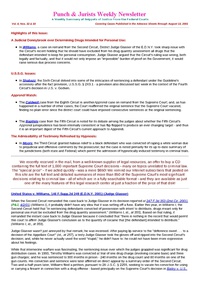The defendant in this case was convicted in state court of three robberies that also formed part of the conspiracy outlined in his federal plea agreement. He was sentenced to 30 years' imprisonment for the state crimes. He was then convicted in Federal court for violating the Hobbs Act …
In this decision, the panel held that the Apprendi rule does not apply to the imposition of mandatory minimum sentences - a decision that appears to have ignored another panel's decision in U.S. v. Velasco-Heredia, 249 F.3d 963.
In this case, the Ninth Circuit held that the Apprendi …
The defendant in this case presented an issue relating to the interplay between Apprendi and the appropriate calculations under the career offender guideline, U.S.S.G. § 4B1.1. Here, the plea
agreement and the PSR specified that Gilliam's original base level for his participation in the drug conspiracy was 32. However, …
The defendant in this case was found guilty at trial of being a felon in possession of a firearm, and he was sentenced to 77 months in prison, which included a two-level stolen firearm enhancement under U.S.S.G. § 2K2.1(b)(4). He appealed that sentence, arguing, inter alia, that the two-level …
In 1998, the Government commenced a major RICO trial against five alleged members of the Detroit Cosa Nostra, one of whom was Paul Corrado, whose most serious charge was conspiracy to commit murder. Two days before closing arguments in that trial, the defendant in the instant, Khalid Shabazz, approached …
In this case the Eleventh Circuit held that since forfeiture is a punishment, and not an element of the offense, proof relating to a forfeiture count need not be established beyond a reasonable doubt in light of Apprendi v. New Jersey, 530 U.S. 466 (2000). Following the rule of …
It often seems as if the Supreme Court’s decision in Apprendi v. New Jersey, 530 U.S. 466 (2000) has created the same sort of fervor and dissension in judicial circles that the abortion issue has created in religious and political circles. As Apprendi appeals have mounted, we have often …
Here, on remand from the 2nd Circuit, Judge Glasser took sharp issue with that court's ruling that he should have excluded from his drug quantity assessment all drugs that the defendant intended to keep for personal consumption.
When the Second Circuit remanded this case back to Judge Glasser …
In this case, the Third Circuit reversed the district court’s denial of a writ of habeas corpus, and held that the appellant’s 1987 trial for rape and robbery “was so infected with unfairness that he was denied due process.” It thus directed the State of New Jersey to either …
In its ruling, the Court stated: "In calculating King's sentence, the district court enhanced the applicable Guidelines range based upon facts it found by a preponderance of the evidence to be true but that had not been submitted to the jury. It then imposed a sentence of 120 months …
Here the Court held that Apprendi does not require the trial court to submit to the jury for its determination the quantity of drugs that are used to increase a Guidelines sentence so long as it is within the prescribed statutory maximum.
Here, in rejecting the defendant's argument …
Here, over the dissent of Judge Williams, the majority concluded that the inmate's claim of a violent, random assault by a prison guard dealt with "prison conditions" and thus required that he exhaust his administrative remedies under 42 USC § 1997e(a).
Here the Court held that any Apprendi challenge to the imposition of a two-level leadership enhancement was "categoricaly barred" where that enhancement did not lead to the imposition of a sentence above the prescribed statutory maximum.
Here, on remand from the Supreme Court, the Eighth Circuit affirmed the 160-month sentence that had been vacated since the defendant could have been sentenced to three consecutive sentences of 60 months each under USSG § 5G1.2(d).
Not long after the Supreme Court issued its momentous decision in …
